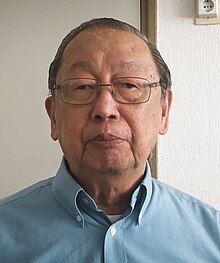
Back خوسيه ماريا سيسون Arabic Jose Maria Sison BCL হোসে মারিয়া সিসন Bengali/Bangla Jose Maria Sison Catalan Jose Maria Sison CEB José María Canlás Sison German José María Sison Spanish خوزه ماریا سیسون Persian José María Sison French Խոսե Մարիա Սիսոն Armenian
Jose Maria Sison | |
|---|---|
 Sison in 2020 | |
| Founding Chairperson of the Communist Party of the Philippines | |
| In office December 26, 1968 – 1977[1] | |
| Preceded by | Position established |
| Succeeded by | Rodolfo Salas |
| Personal details | |
| Born | Jose Maria Canlas Sison February 8, 1939 Cabugao, Ilocos Sur, Commonwealth of the Philippines |
| Died | December 16, 2022 (aged 83) Utrecht, Netherlands |
| Political party | CPP (1968–2022) |
| Other political affiliations | NDF (1973–2022) PKP-1930 (1962–1968) |
| Spouse |
Julieta de Lima (m. 1959) |
| Children | 4 |
| Alma mater | University of the Philippines Diliman (BA) |
| Website | www |
| Military service | |
| Allegiance | |
| Battles/wars | New People's Army rebellion |
Jose Maria Canlas Sison (Tagalog: [hoˈse mɐˈɾija kɐnˈlas ˈsisɔn]; February 8, 1939 – December 16, 2022), also known as Joma, was a Filipino writer, poet, and activist who founded and led the Communist Party of the Philippines (CPP) and added elements of Maoism to its philosophy—which would be known as National Democracy. His ideology was formed by applying Marxism–Leninism–Maoism to the history and circumstances of the Philippines.
Sison was born in Ilocos Sur to a landowning political family. He was educated in Manila, studying at Ateneo de Manila University, Colegio de San Juan de Letran, and the University of the Philippines. He then became a professor of literature, political science, and Rizal studies. During his youth, he learned about the rebellion of the communist Hukbalahap (Huk), which ended in 1954. Sison joined the Partido Komunista ng Pilipinas (PKP; "Philippine Communist Party") in 1962 and became a member of its executive committee in early 1963. In 1964 he co-founded the Kabataang Makabayan ("Patriotic Youth"). However, Sison's faction had several disagreements with the PKP leading to the First Great Rectification Movement. After Sison's faction were expelled from the PKP, he founded and became the chairman of the Communist Party of the Philippines (CPP) in 1968. Three months later, Sison and Bernabe Buscayno, who led a faction of Huk holdouts, organized the New People's Army (NPA) to stage a proletarian revolution. Sison was captured in 1977 and was imprisoned, mostly in solitary confinement, until the People Power Revolution of 1986. The new government under President Corazon Aquino released him for the sake of "national reconciliation" and for his role in opposing the martial law regime of President Ferdinand Marcos. Nonetheless, he also criticized the Aquino administration. In 1988, while in the Netherlands as part of his international lecture tour, his passport was revoked and he was charged in the Philippines for violating the Anti-Subversion Act. From then on, he lived in the Netherlands but continued to advise the communist movement in the Philippines.
Since August 2002, Sison has been classified as a "person supporting terrorism" by the United States. The European Court of First Instance ruled in September 2009 to delist him as a "person supporting terrorism" and reversed a decision by member governments to freeze his assets.[2][3] Sison was charged with several counts of murder in the Philippines and the Netherlands (later dropped). He died in exile in 2022.
The CPP, NPA, and the National Democratic Front (NDF) are considered terrorist organizations by the Philippines' Anti-Terrorism Council.[4][5][6][7]
| Part of a series on |
| Maoism |
|---|
 |
- ^ "Communist Party of the Philippines–New People's Army". Mapping Militants. Center for International Security and Cooperation. Retrieved November 18, 2021.
- ^ IHT, EU court overturns decision to freeze assets of exiled Philippine rebel, Palestinian group, nytimes.com.
- ^ JAVNO, EU Court Overturns Two EU Terrorist Listings Archived September 28, 2007, at the Wayback Machine, dalje.com.
- ^ "Groups urges Dutch gov't anew to stop coddling terrorist Joma". www.pna.gov.ph. Retrieved August 28, 2022.
- ^ "Hand over Joma Sison to PH, groups tell Dutch gov't". www.pna.gov.ph. Retrieved August 28, 2022.
- ^ Mateo, Janvic. "Twitter suspends Joma, CPP-linked accounts". Philstar.com. Retrieved August 28, 2022.
- ^ "PH seeks terrorist tag for Joma Sison, 648 others". RAPPLER. March 9, 2018. Retrieved August 28, 2022.